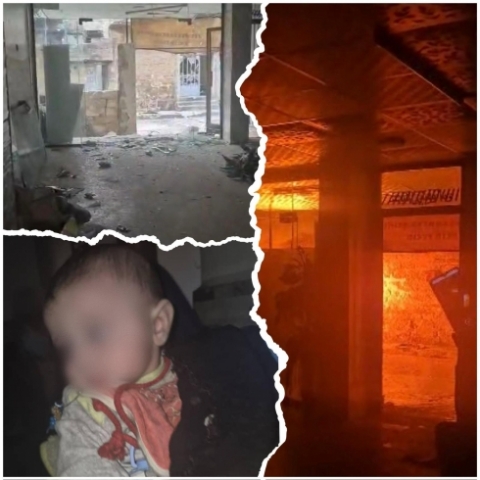

Kurds of Syria and Difficult Choices
2020-01-11
Writer: Alan Hassan:
As the southern regions have ended their battles before others, subsequent to them the central regions, ending with the northern regions which remained waiting for their last wars and settlements that seems not to be less cruel, if compared to military battles. After more than eight years have passed since the Syrian war, of which end in the region seems to be going in an opposite path to what it started in 2011, the alliances of the Syrian war factions have become vacillating between the contradicting regional and international powers. For instance, the Kurds of Syria have allied with the Syrian government, since the beginning of the Syrian war, in the opposition forces face that were aiming at the overthrow of the regime without providing any prior practical solution to the Kurdish issue in Syria. Thus, dividing the Kurds themselves between involving in the opposition program or embarking on an alliance with the regime. The Democratic Union Party chose to coordinate with the Syrian government and established a self-administration in the beginning of 2014 in the regions of Al-Jazeera, Kobani/Ain Al-Arab and Afrin. This was followed by the democratic federalism in north Syria declaration in the middle of 2016, subsequently, the declaration of the Self-Administration in NES in late 2018.
The second Kurdish segment was the Kurdish National Council, which chose to join the Syrian opposition frameworks represented by the Syrian National Council, that was established in 2011 and explicitly called for the overthrow of the Syrian President Bashar al-Assad regime, as it was part of the National Coalition for the Syrian Revolution and Opposition Forces formed in 2012. The Council has strong relations with the Kurdistan Democratic Party; Kurdistan Region of Iraq and its President Masoud Barzani. Moreover, it has a military force called "Roj Peshmerga" directly linked to the forces of the Iraqi Kurdistan Peshmerga, in addition to their participation in some of its battles against ISIS since 2014. Furthermore, the Kurdish Progressive Democratic Party in Syria, the most ancient Syrian Kurdish party, the late head of which was Abdul Hamid Darwish, who has a close relationship with the Patriotic Union of Kurdistan in Iraq and has a moderate attitude towards the Syrian government.
The alliance of Kurds with Syria and the United States of America was confined to the military side, starting with the battle to regain control of Kobani in late 2014, the battles of Giresipi/Tell Abyad and Raqqa, ending with the eastern part of the Euphrates River. This took place according to the US-Russian understanding on sharing control over Syria; starting from the Euphrates River line. That military alliance was not accompanied by any political recognition of the Self-Administration or the adoption of any political project regarding the future of Syria. Thus, after the end of the battles against ISIS, that alone was enough to cause great fear for the future of the region.
The announcement by US President Donald Trump of his intention to withdraw from Syria in the spring of 2018 was a great fear for the Kurds of Syria. For Trump's retreat from his announcement would not have removed their concerns of a Turkish attack similar to what happened in Afrin in early 2018. The Democratic Syrian Council; the SDF political representative, held dialogues with the Syrian government in order to save what could be saved. However, the stiffness of both parties to their attitudes and the American retreat from the withdrawal at the time, have returned everything to what it was. This has remained the case until President Trump announced, in the late of 2018, that withdrawal of his forces from Syria within a maximum period of thirty days. This was an indisputable statement that Syria's strategic importance was missing in the American balance. Despite this, the Syrian Democratic Council bet on changing Trump's attitude once again. The Pentagon pressure had a role in a slight change in the American president position and the postponement, not its abolition, of the withdrawal process; especially as it coincided with the end of the battles against ISIS.
The Turkish pressure was gradually increasing to keep the elements of YPG from their borders, moreover to thwart the experiment
of Self-Administration, before the American position changes and before it becomes recognized politically. The third American position, of the desire to withdraw, which coincided with the start of the Turkish military operation during this month, has left no room for SDF except for a rapid military agreement with the Syrian government, under Russian auspice, that led to the deployment of the Syrian army on the border strip with Turkey, as well as, in some cities that were expected to be attacked by the Turkish army and its loyal Syrian factions.
It is not possible to bet on a strategic American role anymore, as President Trump has made his intention evident, to keep a small number of American soldiers in the oil regions; which hold 90% of Syrian oil and 45% of gas. Nevertheless, this cannot be a strategic option in light of the urgent need of the Syrian government for these resources in the future. Also, the role that Moscow is expected to play in buying this ticket from the United States in exchange for files, might be the ticket to the exit of Iranian militias or giving American companies oil concessions or even the participation of some American companies in the reconstruction of Syria.
The most realistic solution is to forge a new relationship between the Syrian Democratic Council and the Russian Federation, as well as, overcome the crisis of their relationship. Especially after the contradictions that followed the withdrawal of the Russian forces from Afrin city, marking the start of the Turkish "olive branch" operation and the dialogue with the Syrian government to find compromises to the East Euphrates crisis, such as the Kurdish case, of which national solution is sure to contribute to enhancing Syria's power and the speed of regaining its strength; after being exhausted by the devastating war.
Today, Russia is the strongest party in the Syrian equation and it is the one who holds the strings of the game. Therefore, bypassing the Russian role is an incalculable consequences adventure. Consequently, its nurture of any upcoming dialogue between the Syrian Democratic Council and Damascus is of extreme significance; due to Moscow's influence on the Syrian government, which is expected to be used to impose a governance model that provide a margin of decentralization that the Kurds are demanding, in light of the rigid attitude of the Syrian government.



